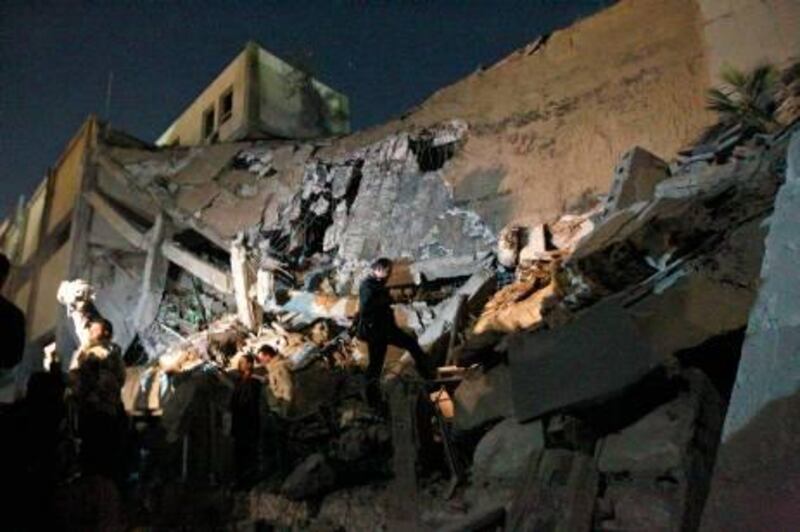WASHINGTON // With a rain of missile strikes on Libya's air-defence capabilities, and Western warplanes targeting ground forces deemed to be engaged in offensive action, military commanders in the US and Europe say the first stage of the UN-mandated international operation is nearing completion.
What comes next, however, is not clear, even to military planners, who have openly admitted that the endgame has not been defined. Certainly Admiral Mike Mullen, chairman of the US Joint Chiefs of Staff , doing the rounds of the morning network news shows on Sunday, had no ready answer to the question.
"There have been lots of options which have been discussed, but I think it's very uncertain how this ends," Adm Mullen told CBS's Face the Nation. Asked to clarify the mission on CNN's State of the Union, he was equally equivocal, saying only that "circumstances will drive" the operation.
Washington has been clear that no US forces will be deployed on the ground, a move also explicitly proscribed by UN Security Council Resolution 1973, which mandated the no-fly zone. The US military is keen to take a back-seat role to its allies once the initial US-led air operation is over.
But under the assumption that forces loyal to Muammar Qaddafi, the Libyan leader, will observe or be forced to observe a ceasefire, options for military planners begin to thin out.
One option that has been taken off the table is any attempt to target Col Qaddafi personally. Western military chiefs were busy yesterday denying that an air strike on Col Qaddafi's residential compound on Sunday was intended for the Libyan leader.
A ceasefire, as called for by Resolution 1973, would essentially freeze the current positions, with opposition forces in control of some cities in the east of Libya and Col Qaddafi's forces in control of most of the rest of the country. It would satisfy the main priority of international intervention to end the violence, but would not, immediately at least, bring any closer the end of Col Qaddafi's rule, as Barack Obama, the US president, and other western leaders have called for.
This might be the best outcome for now, said Michael O'Hanlon, a national security and defence specialist with the Washington-based Brookings Institution. The priority, he suggested, had to be to end the "brutality [Col Qaddafi] has been employing against his own citizens and rebels".
Mr O'Hanloj said: "Yes, we've called for Qaddafi's ouster, but if you could persuade him to first accept a ceasefire and then, let's say international monitoring troops … maybe we could all agree not to continue fighting."
From there "some kind of power-sharing arrangement or an ultimate departure by Qaddafi" might be sought through the use of "diplomacy, economic pressure and patience", Mr O'Hanlon said.
That, however, could be a drawn-out process and invokes the first Iraq war, where under a UN mandate international coalition forces ousted Iraqi troops from Kuwait but stopped short of pushing all the way to Baghdad.
Saddam Hussein, the Iraqi president at the time, did not fall to domestic pressure as expected and the economic sanctions imposed for over a decade after that war arguably proved more harmful to Iraqi civilians then to the regime, which eventually fell only to an all-out US occupation in 2003. Without the deployment of ground troops, however, air power has limited utility.
Mr Obama on Friday not only called for Col Qaddafi's forces to stop their advance on Benghazi, the largest remaining opposition stronghold, but to withdraw from cities they had retaken from the opposition, including Ajdabiya, Misrata, and Zawiya. But that would be hard to accomplish from the air, said Nathan Hughes, director of military analysis at Stratfor, a Texas-based global intelligence company.
"It's very difficult to use air power to eject a military formation from within an urban area without eyes on the ground. It's very difficult to identify targets and verify them, especially in an actionable way and prevent civilian casualties."
One question that is being intensely debated is whether and to what extent the international coalition empowers the Libyan opposition.
Mr O'Hanlon suggested that arming the opposition should be seriously considered, but there are several problems with the option.
Unlike in Afghanistan, where the Northern Alliance was a ready-formed militia group that had already fought for years against Taliban rule, the Libyan opposition has no similar cohesion or training.
Indeed, the almost total reversal of fortunes in Libya over the past month, where momentum swung from what looked like an irreversible tide against Col Qaddafi to what almost became a complete rout of opposition forces, suggests that they do not represent a meaningful military force.
"They could certainly be more coherently armed, but it's not clear that giving them more weapons will get you anything," Mr Hughes said. On the contrary, he argued, "you'll only be putting more weapons into a situation that's already seen massive proliferation" and that would have "repercussions for years, probably decades".
Moreover, an already jittery Arab League might become more uncomfortable if the UN mandate was interpreted more broadly then merely to protect civilians, and became more obviously about taking sides in a civil war.
Steven Clemons, a senior fellow with the Washington-based New America Foundation, suggested that perhaps the only hope for swift resolution if a stalemate developed as a result of a ceasefire, would involve one of Col Qaddafi's inner circle turning against him, given Libya's isolation.
But, he cautioned, it is almost impossible to gauge how likely such a scenario is.
In reality, he said, "the history of most revolutions is that the regimes often win".





